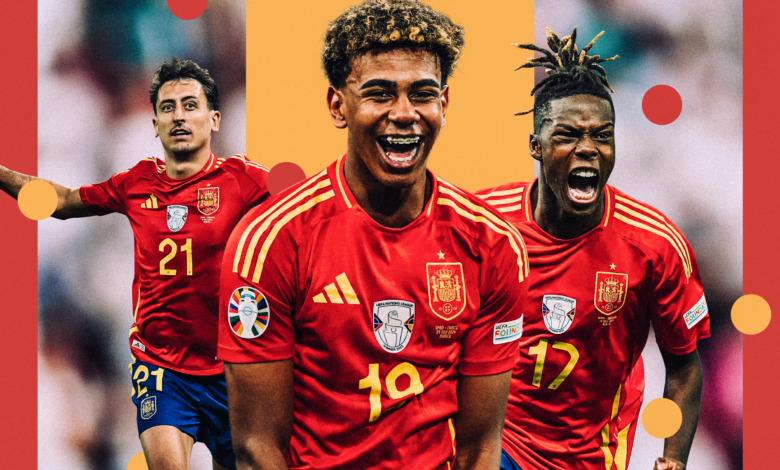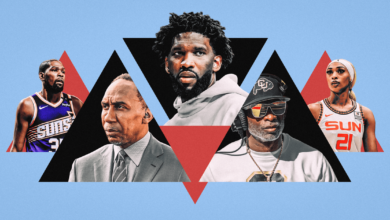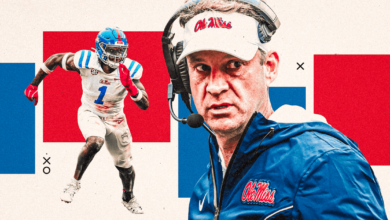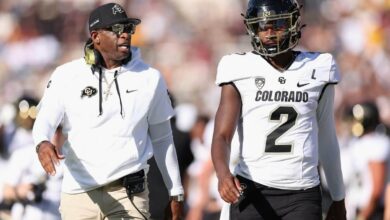Decisive De la Fuente, Morata’s leadership, Yamal and Williams’ bond – how Spain won Euro 2024

Spain arrived in Germany under the radar, with a feeling they were unnoticed. They leave not just as the European champions — but with another thrilling generation with the potential to rule the world.
This was the Euros of Lamine Yamal and Nico Williams, two adolescents off the pitch who turned into gamebreakers in a competition that changed their lives forever. It was the competition of Rodri, a Ballon d’Or contender in the making. But in general, it belongs to a team who have been head and shoulders above everyone else.
Luis de la Fuente’s side swept past Germany, France and eventually England — the three biggest candidates to win the competition — and none of them could complain.
Spain fans will remember Euro 2024 because it was not another win: it was an unexpected one. This squad was meant to be good, but not this good, and especially not at this age. They have won seven games out of seven. The best player of the tournament, as well as the best young player, were Rodri and Yamal.
The Athletic has spoken to multiple people over the past four weeks, many speaking on condition of anonymity as they were not cleared to speak publicly at the time, to tell the inside story of what their success has been built on. It includes…
- The leadership of Alvaro Morata
- The unnoticed talent De la Fuente showed to the world
- How the players embraced the change of style
- The Yamal and Williams explosion
Morata — misunderstood but a ‘brilliant captain’
Morata is fascinating. The 31-year-old striker has not been one of Spain’s standout performers, he scored one goal in seven games, and it is the one position De la Fuente would appreciate an improvement in.
But it is impossible to analyse this Spain team without the figure of its captain — and the most-loved character in the dressing room.
“Media have given him and keep giving him a lot of stick… but I am telling you: he is the best bloke in that dressing room,” said one person familiar with the team environment in Germany when asked about Morata.
“You might think that’s how I’ll describe every player we have here, but that’s not cheap praise. Trust me. A brilliant captain, the perfect guy for this group.”

Morata lifts the trophy as captain (Alex Grimm/Getty Images)
Both things are true. The amount of pressure Morata has had to deal with over the last three major competitions for Spain has been almost unprecedented. He was booed by his own fans in March in a friendly at the Santiago Bernabeu. “My kids can’t understand why fans are booing his dad,” he said in Germany.
But inside the dressing room, where it matters most, the feeling is the opposite. “Morata is undoubtedly the player who creates more bonds inside the group and one of the funniest guys. Whenever he is talking, all the young guys listen to him and his stories, he is brilliant,” said Yamal before the start of the competition, to the surprise of many fans.
He has been the heart of the base camp Spain set in Donaueschingen, a small town in the Black Forest. Apart from having Yamal, Williams, Fermin Lopez or Alex Baena paying close attention to his stories, he has given golf classes to Marc Cucurella and Alex Remiro.
He was a poker partner for Dani Carvajal, Joselu, David Raya and Ayoze Perez. Before the start of the competition, he asked every player to choose a song to put on their Spotify playlist to have all tastes represented and he was the DJ of the dressing room. The song La Potra Salvaje became an anthem and was played after every win once the full squad was on the team bus.
He has taken the diplomacy reins, too. Morata led the negotiations with the Spanish FA to define the bonuses related to performances. He wanted an extra share of the total bonus split among the staff that works every day with them — from the kit men to the media team, from physiotherapists to the chefs.
In the build-up to the final, he was supposed to speak alongside the manager in the press conference. Instead, he asked the FA to put Jesus Navas in place, so the 38-year-old could announce he was retiring from the national team.
Morata said during the competition that “he does not feel valued in Spain and sometimes you feel more love from abroad”. He has been working with psychologists and after winning the competition, he confessed to national TV, La 1, that two ex-Spanish players prevented him from retiring.
“If it had not been for Andres Iniesta and Bojan Krkic, I would not have played this Euros. They are the sort of people who are gifts from life. They went through similar situations I’ve had here. At the end of the tunnel, there is always light.”
This Euros turned Morata into the fourth-best goalscorer ever for Spain, with 36 goals in 80 games. De la Fuente said that, if he had to reincarnate as a player of his team, it would be his captain.
He might as well retire after this success, but Morata’s example has had a deep impact — his mission completed.
De la who?
Declan Rice said he did not know the Spanish manager before this Euros and you can’t really blame him for it — De la Fuente’s experience at a club level is reduced, at its best, to two failed projects in Spain’s third tier.
But on an international level, it is another story. The 63-year-old has been a part of Spain’s setup since 2013 — enough time to feature in five major tournaments in the youth ranks. He became champion in two and reached the semi-finals at least in all of them. Despite Euro 2024 being his first experience at a senior level, he has delivered again.

De la Fuente hugs Williams — whose partnership with Yamal has been key to Spain’s success (Odd Andersen/AFP via Getty Images)
He created an enjoyable environment around the team rather than preferring names loved by the media, such as defender Sergio Ramos or Real Madrid forward Brahim Diaz, the latter eventually opting to represent Morocco.
De la Fuente’s biggest achievement has been passing on his experience in knockout tournaments to a squad who have never looked shocked by the biggest stage.
“I am fully convinced that the players we have here are the best we have to win this. I would not change any of them,” he said when he announced his squad.
“The absolute priority we had was to make sure we found a good role distribution on the pitch. Let every player know what we expected from them and show how they could make the difference,” a member of the coaching staff says to The Athletic.
“We had a pretty solid structure from before the competition. The players knew it. We knew them so well from youth ranks. All was set and we just needed to put the ball into the back of the net. As soon as it happened… it clicked.”
Spain’s dressing room knew few people were tipping them for glory, but they have used that as motivation to prove people wrong.
“This generation has a winning mentality, shown from the youth ranks,” said Mikel Merino before the start of the tournament. “This is the biggest of the pressures and what we set ourselves for. We don’t look at what’s said on the outside.”
For all the young stars, the veterans played a specific role, too. Navas was the only player left from the 2008 Spanish golden generation, led by Xavi Hernandez, Iker Casillas, Iniesta and Ramos.
Navas has been dealing with a chronic hip injury for the last four seasons but, despite everything, he wanted to be there. He was needed to start in the semi-final against France after Dani Carvajal was sent off in the quarter-final win over Germany. He played 58 minutes in which he was able to contain Kylian Mbappe.
That same night, people briefed on the situation say Navas could not sleep due to the pain he was in with his hip.
The example he set to the younger generation in that team regarding the values and commitment to defend the shirt, in the eyes of De la Fuente’s staff, is as precious as any win they could get.
Spain were convinced they could go all the way thanks to De la Fuente’s faith in them. When the rest of the world realised that, it was too late to make them crumble.
Players embraced the new era
A 3-0 win against Croatia in the opening game revealed a lot about Spain: the tiki-taka days were gone. Spain had less possession for the first time in 136 competitive matches — but deservedly won.
Becoming a versatile team was the biggest demand De la Fuente sought when he was appointed as the national manager after the 2022 World Cup in Qatar, as memories of the defeat on penalties to Morocco were fresh and poignant.
De la Fuente has involved certain players within the general leadership of the group — and listened to as many of them as possible.
Particularly relevant was a moment in the quarter-final against Germany. During the second half, with the hosts pushing for an equaliser, Carvajal asked his manager to take Yamal off, as the German wing-backs were causing problems and the teenager was struggling to keep up with the tracking back. De la Fuente agreed and Ferran Torres replaced him in the 63rd minute.
Another of the players who has been listened to has been Rodri. The Manchester City midfielder believed that neutralising their opposition’s counter-attacks was crucial if Spain wanted to beat the best teams.

Rodri was named the best player of the tournament (Javier Soriano/AFP via Getty Images)
The prime example arrived before the last-four meeting with France. The team had barely time to train, as they needed to recover fitness levels, so De la Fuente focused on one aspect: counter-pressing after losing the ball and guarding against counter-attacks.
De la Fuente believed the basics of their style were so well-processed by his players that he preferred to focus training on reducing their weaknesses. The assistant manager and former La Liga player, Pablo Amo, is one of the names praised for his role in training.
“Thanks to the work Spanish academies are putting in, we believe the Spanish footballers are the ones with the best decision-making in the world,” a member of the coaching staff says.
“All players have to identify what every play requires and the execution that follows is normally right. Knowing we have that, for us it was only to boost it and try to correct the things we lacked the most.
“We are not here to improve our players because we don’t have the time. If they are here, it’s because they are already so good at many things. Our only goal is to make our player’s life in-game easier. That’s how we plan.”
Yamal and Williams announce themselves to the world
For them, it all started in Georgia in the qualifiers. It was September 2023 and De la Fuente had just won the Nations League, but the pressure on him had not faded completely.
Spain clinched the trophy with two hard-fought wins, one in extra time and the other after penalties, against Italy and Croatia. Results were better than feelings and there was plenty of work to do. Their place at the Euros was not secured after a loss in Scotland.
Spain were about to travel to face Georgia, a side against whom they had struggled to beat. De la Fuente opted to use a refreshing duo on the wings: Williams and Yamal played together for the first time. Spain won 7-1 and they both scored.

Yamal and Williams share a moment in Berlin at the final whistle (Jewel SAMAD / AFP)
Four days later, Williams and Yamal started another qualifier, against Cyprus — Spain won 6-0. Williams provided two assists, while Yamal’s craft blew everyone’s mind. That was the birth of the partnership that lit up Euro 2024.
“That trip to Georgia is key to understanding success,” says a member of the backroom staff. “It was a release point. Pressure was still around and the way we played helped us to believe we were on the right track.”
The way Yamal and Williams clicked on and off the pitch was beyond their wildest dreams.
The wingers got to know each other in September last year thanks to Barcelona and Spain full-back Alejandro Balde. Yamal and Williams were soon sharing rooms on international duty, filming TikToks and bolstering their chemistry on the pitch.
In Germany, the bromance kept going. Williams, 22, called Yamal “his son” as he claimed “he still needs to learn from the advice of his elder one”. The teenager would reply to his joke saying he completely owned his counterpart when they faced each other at EA FC24.
Williams was the man of the match in the final against England; Yamal was the young player of the tournament. They have been involved in eight goals in the tournament.
“They are the new era,” a member of the Spanish FA told The Athletic. They have become the indisputable favourites of every fan. They are role models in a country where dealing with racism in sport has been debated repeatedly, two young athletes from an immigrant background are showing everyone what the real Spain looks like.

“They are a constant joy, they have added this to the team” De la Fuente said. “We have a mature squad, very professional, and then those guys are so fun to be with. They’ve fitted so well with the veterans, who took the fresh air they brought and revitalised themselves, too. Our more senior players help a lot in guiding them. The exchange and impact is really positive.”
Now it will be time to look at their immediate future — especially in the case of Williams. Will Athletic Bilbao be able to keep him? His £55million ($71.4m) release clause will surely be too tempting for top European clubs…
Turning issues into blessings
Nobody would believe losing a player such as Pedri to injury could be good news — but it turned out to open a door for Dani Olmo. The RB Leipzig attacking midfielder was not a starter but ended the Euro 2024 as the top goalscorer with three goals. He came on in the eighth minute against Germany after Pedri’s injury and took a starring role.
The instant solutions De la Fuente has found to the minor issues that emerged throughout the competition have been a decisive factor in their success.

Olmo celebrates his semi-final winner against France (Alex Livesey/Getty Images)
Nacho started against Croatia after a brilliant end-of-season at Real Madrid as Aymeric Laporte was suffering some physical discomfort. Then it was Nacho who was injured and reopened a door for Laporte to flourish as their best centre-back.
De la Fuente had a big call to make on the left-back role. He opted for Chelsea’s Marc Cucurella in front of Alex Grimaldo, who starred for Bayer Leverkusen, and it was inspired.
“Sometimes we believe we need to use the best players available, but it’s more important to use those who make your team better,” one person with an understanding of the dressing room environment said. Cucurella excelled defensively and his brilliant cross set up Mikel Oyarzabal to score the winner in the final.
Then there is Fabian Ruiz. The 28-year-old Paris Saint-Germain midfielder was one of the starters with the lowest pedigree among the group before Euro 2024. He scored once and laid on another against Croatia and was a dominant midfielder throughout the competition.

Fabian was one of the stars of the tournament (Richard Pelham/Getty Images)
There has been an emergence of unexpected heroes, too. Merino scored the winner against Germany in the same stadium where his dad scored for Osasuna back in the 1990s.
And Oyarzabal, the Real Sociedad forward who missed the last World Cup due to a serious knee injury, vindicated his recovery process with the 86th-minute winner against England.
Football is not meant to be a fair sport, but Spain were not meant to be the best team in this competition.
(Top photos: Getty; Dan Mullan, Miguel Medina/AFP, Ina Fassbender/AFP; design: Dan Goldfarb)




